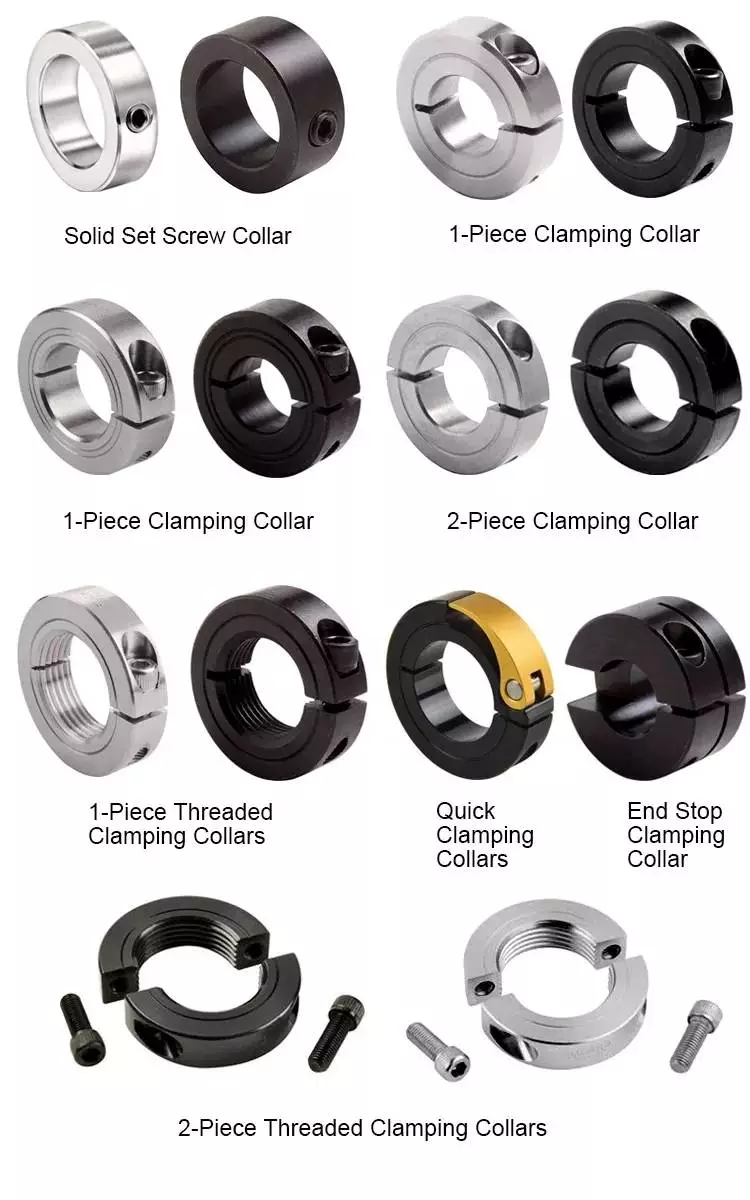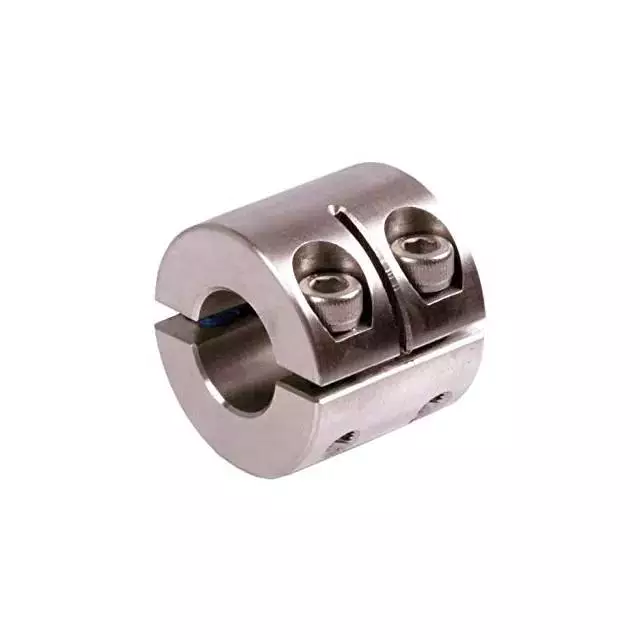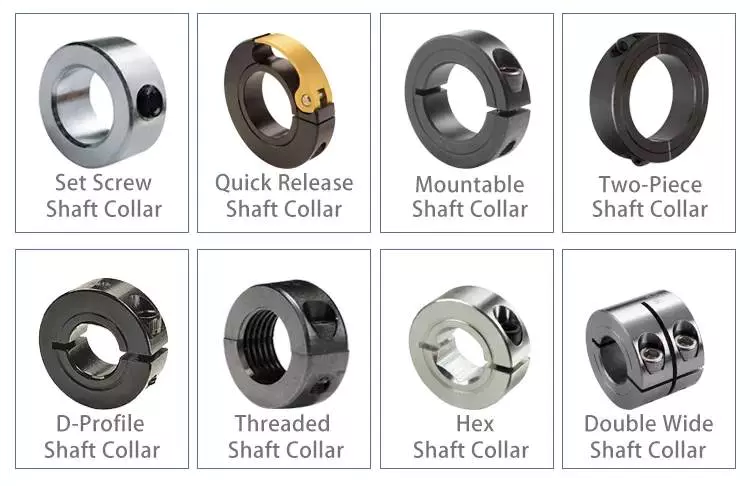
Can I purchase shaft collars with specific certifications for certain industries?
Yes, it is possible to purchase shaft collars with specific certifications for certain industries. Certifications ensure that the shaft collars meet specific standards, requirements, or regulations established for particular industries or applications. Here are some important points to consider when purchasing shaft collars with specific certifications:
- Industry-Specific Certifications: Different industries may have specific certifications or standards that shaft collars need to meet to ensure compliance with safety, performance, or regulatory requirements. For example, industries such as automotive, aerospace, food processing, medical, or oil and gas may require shaft collars that meet certifications such as ISO 9001 (quality management system), ISO 14001 (environmental management system), AS9100 (aerospace quality management system), or FDA (Food and Drug Administration) compliance. Identify the specific certifications relevant to your industry and application.
- Manufacturer Certifications: Some manufacturers specialize in producing shaft collars that are certified for specific industries or applications. They may have their own certifications or comply with industry-specific standards. When purchasing shaft collars, look for manufacturers who have the necessary certifications and a track record of producing compliant products. Their certifications should be prominently displayed on their website, product documentation, or available upon request.
- Product Documentation and Specifications: Shaft collar manufacturers often provide product documentation, specifications, or datasheets that outline the certifications and standards their products comply with. These documents may include information about industry-specific certifications, material certifications (such as RoHS compliance for restricted substances), or performance ratings. Review the product documentation carefully to ensure the shaft collars meet the necessary certifications for your industry or application.
- Supplier Verification: If you are purchasing shaft collars from a supplier or distributor, verify that they source their products from reputable manufacturers who adhere to industry-specific certifications. Request documentation or certifications from the supplier to confirm compliance. It is essential to ensure that the entire supply chain, from the manufacturer to the supplier, maintains the necessary certifications required for your industry.
- Consultation with Industry Experts: If you have specific certification requirements for your industry or application and are unsure about the available options, it is advisable to consult with industry experts or engineers specializing in that field. They can provide guidance on the certifications needed and recommend suitable shaft collar manufacturers or suppliers who can meet those requirements.
When purchasing shaft collars with specific certifications, it is important to verify the authenticity and validity of the certifications. Look for reputable manufacturers, suppliers, or distributors who have a proven track record of delivering certified products and maintaining compliance with industry standards. The certifications provide assurance that the shaft collars meet the necessary quality and safety standards for your industry or application.

Where can I find information on the materials used in manufacturing shaft collars?
If you are looking for information on the materials used in manufacturing shaft collars, there are several sources where you can find relevant information. Here are some common resources to consider:
- Manufacturer Websites: Many manufacturers of shaft collars provide detailed information about the materials they use in their product specifications or technical datasheets. Visiting the websites of specific collar manufacturers and exploring their product documentation or resources section can help you find information about the materials used in their collars. This information may include the type of material (such as steel, stainless steel, aluminum, or plastic) and any specific properties or characteristics associated with the material.
- Product Catalogs and Brochures: Manufacturers often publish product catalogs or brochures that provide an overview of their collar offerings. These catalogs may include information about the materials used in manufacturing the collars. You can request catalogs from manufacturers directly or check their websites for downloadable versions. The catalogs may highlight the material properties and advantages of using specific materials for different applications.
- Material Databases: Online material databases or directories can be valuable resources for finding information about specific materials used in manufacturing shaft collars. These databases typically provide comprehensive information about various materials, including their composition, mechanical properties, corrosion resistance, temperature tolerance, and other relevant characteristics. Examples of such databases include MatWeb, Engineering Toolbox, or specialized materials databases maintained by industry organizations or universities.
- Technical Standards and Specifications: Technical standards and specifications related to mechanical components can often include information about the materials used in their construction. Standards organizations or industry associations may release documents that outline the material requirements for shaft collars or provide guidelines for material selection. Accessing these standards or specifications can provide insights into the recommended materials for shaft collar manufacturing.
- Consulting with Manufacturers or Suppliers: If you have specific questions about the materials used in manufacturing shaft collars, reaching out directly to manufacturers or suppliers can be beneficial. They can provide detailed information about the materials they use, including their composition, properties, and any specific treatments or coatings applied to enhance performance. Contacting manufacturers or suppliers allows for direct communication and the opportunity to address any specific concerns or requirements you may have.
When seeking information on materials used in shaft collar manufacturing, it is important to consider factors such as desired properties (e.g., strength, corrosion resistance), environmental compatibility, and application-specific requirements. This will help you make informed decisions about selecting shaft collars that are suitable for your specific needs and operating conditions.

Where can I buy high-quality shaft collars for industrial applications?
When looking to purchase high-quality shaft collars for industrial applications, there are several options available. Here are some common sources where you can find reputable suppliers:
- Industrial Suppliers and Distributors: Industrial suppliers and distributors specialize in providing a wide range of components and equipment for industrial applications. They often carry a variety of shaft collars from different manufacturers. You can search for local industrial suppliers in your area or explore online industrial supply websites. Some well-known industrial suppliers include McMaster-Carr, Grainger, MSC Industrial Supply, and RS Components. These suppliers typically offer a range of options and provide detailed product specifications to help you choose the right shaft collar for your specific requirements.
- Specialty Manufacturers: Some manufacturers specialize in producing shaft collars and related components. These companies often have a strong focus on quality and may offer specialized solutions for specific applications. Research and identify reputable manufacturers that produce high-quality shaft collars. You can visit their websites to explore their product offerings, specifications, and contact information. Some notable manufacturers in the industry include Ruland Manufacturing, Stafford Manufacturing, Climax Metal Products, and Collars and Couplings.
- Online Marketplaces: Online marketplaces provide a platform for various sellers to offer their products, including shaft collars. Platforms like Amazon, eBay, and Alibaba have a wide range of options available from different sellers. When using online marketplaces, it’s important to carefully review seller ratings, product descriptions, and customer reviews to ensure the quality and reliability of the shaft collars being offered. Look for sellers with positive ratings and reputable customer feedback to increase the likelihood of purchasing high-quality products.
- Local Machine Shops and Fabricators: Local machine shops or fabricators that specialize in machining or fabricating custom parts may also offer shaft collars for sale. These shops often have expertise in working with various materials and can provide customized solutions if needed. Contact local machine shops in your area and inquire about their availability of shaft collars or their ability to fabricate them to your specific requirements.
- Trade Shows and Exhibitions: Trade shows and exhibitions related to industrial components and equipment can be excellent opportunities to explore a wide range of suppliers and manufacturers in one place. Attend industry-specific trade shows or exhibitions and visit booths or displays of companies specializing in power transmission, bearings, or mechanical components. This allows you to interact directly with manufacturers or suppliers, discuss your requirements, and assess the quality of their products firsthand.
When purchasing shaft collars for industrial applications, it’s important to consider factors such as material quality, dimensional accuracy, load-bearing capacity, and any specific requirements of your application. Thoroughly evaluate suppliers, review product specifications, and compare prices to ensure you are getting high-quality shaft collars that meet your needs. Additionally, consider factors such as lead time, customer support, and return policies when making your purchasing decision.


editor by CX 2024-03-29